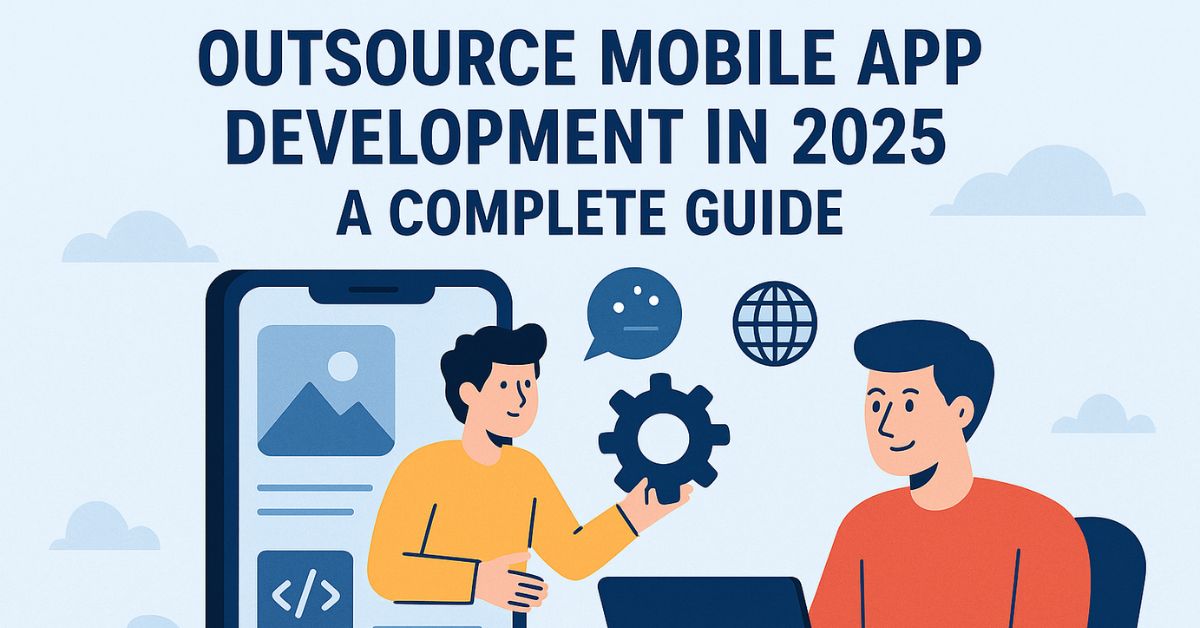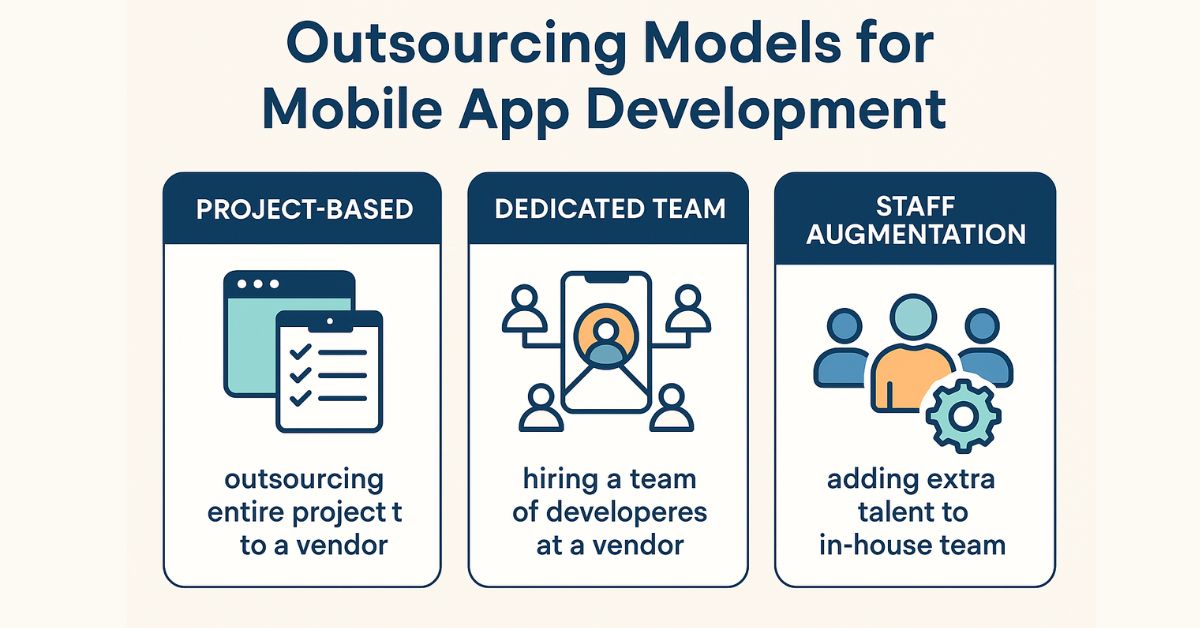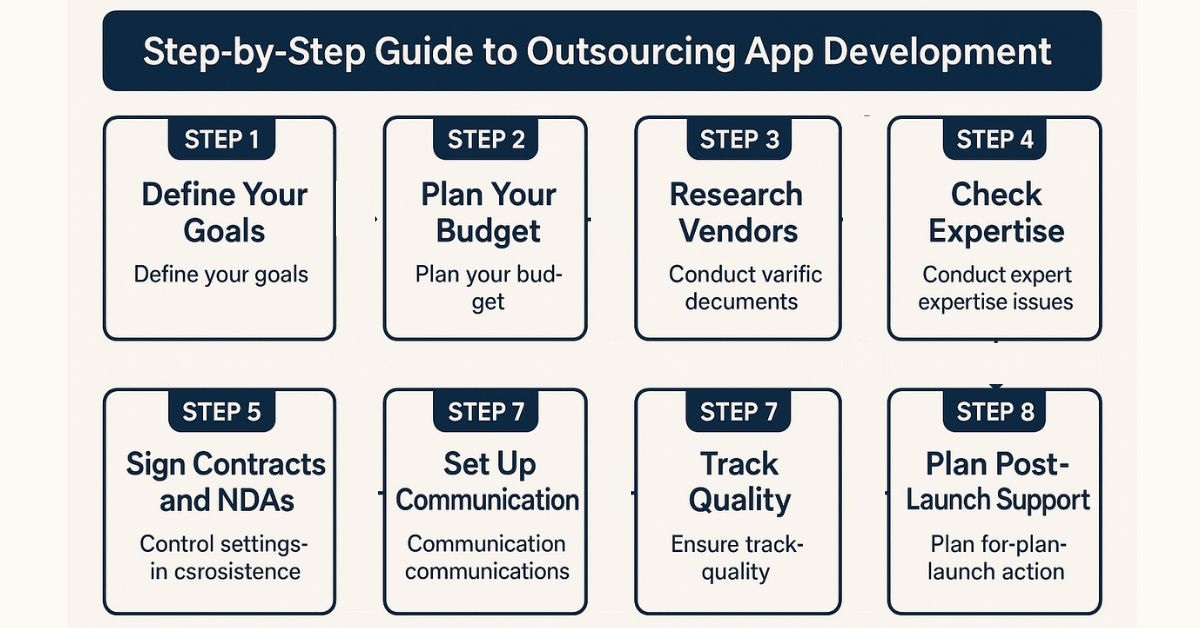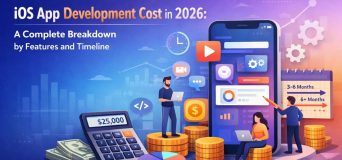
In this guide, you’ll learn what mobile app development outsourcing means in 2025 and why businesses are choosing it. You’ll discover the key benefits—like cost savings, faster delivery, access to global talent, and scalability—along with the main outsourcing models such as fixed-price, dedicated teams, and staff augmentation.
- What is Mobile App Development Outsourcing
- Benefits of Mobile App Development Outsourcing
- Cost of Mobile App Development Outsourcing
- Future Trends
In 2025, outsourcing mobile app development is more than just saving money. It is now a strategy to grow business. Over 60% of companies rely on outsourcing to finish projects faster and lower risks.
Working with an app development agency helps cut the cost of mobile app development. It also gives you access to experts around the world.
Outsourcing has many benefits, but it also comes with risks. The right engagement model and strong post-launch support can lower these risks. This way, offshore software development can help achieve real digital transformation.
Table of Contents
What is Mobile App Development Outsourcing?
Mobile app development outsourcing means hiring an outside team to build and manage your app. You don’t rely only on your in-house staff, but work with experts.
Working with an app development agency can lower the cost of mobile app development. It can also improve quality and speed. This lets your team focus on growing the business.
The benefits of outsourcing mobile app development include expert design, coding, testing, and support. Using the right engagement model, offshore software/app development can manage post-launch services and support digital transformation.
Want to Outsource Mobile App Development the Right Way?
Reduce development costs, speed up time-to-market, and maintain full control by partnering with a trusted mobile app development company.
Key Benefits of Mobile App Development Outsourcing
In 2025, outsourcing mobile app development offers benefits beyond financial savings. It is a smart approach to maintain market leadership and accelerate growth. Businesses may save up to 60% on expenses by mobile app development outsourcing, according to a recent report. Additionally, they are 40% faster at product launches.
The primary benefits of outsourcing mobile app development are as follows:
- Reduced expenses: You pay less for hiring, training, and supplies.
- On-time delivery: Teams that are outsourced already have the necessary tools and procedures. This expedites the completion of projects.
- Help from experts: You receive knowledgeable testers, designers, and developers. They guarantee that the app functions on all devices.
- Increased efficiency: DevOps services are provided by several partners. Updates, security patches, and seamless app distribution are all facilitated by this.
- Scalability: The team’s size can be changed as needed. There are no long-term commitments.
- Focus on business: Your team can work on strategy, sales, and customers. Experts take care of the technical work.
Outsourcing app development today is more than hiring extra help. It is a partnership that builds long-term digital success.
Outsourcing Models for Mobile App Development
When you outsource app development, picking the right model is important. It affects how much control you have, how you pay, and how the work is handled.
The primary engagement models for outsourcing app development are as follows:
- Fixed-Price Model: Best for small projects with specific objectives. You agree on a set cost and timeline.
- Dedicated Team Model: A complete team works only on your app. It is ideal for long projects that may need changes.
- Staff Augmentation: You bring in skilled developers to help your in-house team.
- Project-Based Outsourcing: The external team handles everything—design, coding, testing, and app maintenance.
Every engagement model for app development outsourcing has pros and cons. The best option for you will rely on your timeframe, budget, and desired level of control.
Step-by-Step Guide to Outsourcing Mobile App Development
A clear method is ideal for outsourcing. This is a basic, step-by-step manual for mobile app development outsourcing:
Step 1. Define Your Goals
Establish a specific aim first. Write what the app ought to do. Is it to serve consumers, boost sales, or make work easier? Determine the primary features and who will utilize it. Later misunderstandings can be avoided with a clear plan.
Step 2. Plan Your Budget
Think beyond just the coding cost. The cost of mobile app development includes design, testing, updates, and marketing. Be realistic about your budget. A clear plan helps avoid hidden costs later.
Step 3. Research Vendors
Choose agencies with real experience. Check their case studies, past work, and client reviews. The right mobile app development agency should know your industry and business goals, not just the technology.
Step 4. Check Expertise
Developers alone are not what make a good partner. Verify whether they have testers to ensure the software functions on all devices. Verify whether they provide security patches, bug fixes, and quick updates as well. Time is saved, and the software continues to function properly after startup.
Step 5. Sign Contracts and NDAs
Keep everything in written. Contracts should include timelines, tasks, costs, and who owns the code. An NDA (Non-Disclosure Agreement) protects your idea and important data.
Step 6. Set Up Communication
Clear communication avoids most outsourcing problems. Use tools like Slack, Jira, or Trello to share updates. Have weekly calls to check progress. Keep one main contact to avoid confusion.
Step 7. Track Quality
Don’t put off testing the app until the very end. Request frequent code inspections and demos. Testing at each stage helps find and fix problems early. An app development agency can make this process better.
Step 8. Plan Post-Launch Support
Launching the app is only the beginning. You require frequent security audits, bug patches, and upgrades. Decide on the post-launch app services that your partner will offer. This keeps your app safe and up-to-date.
This step-by-step plan lowers risks and builds trust with your outsourcing partner. It makes outsourcing a smooth, long-term partnership.
Challenges of Outsourcing Mobile App Development and How to Overcome Them
Outsourcing mobile app development has many benefits, but it also comes with challenges. Knowing the risks early helps you handle them well. Here are common problems and ways to solve them:
1. Communication Gaps
The Challenge:
Time zones, language differences, and unclear instructions can slow work. This is a key risk of outsourcing app development.
The Solution:
Set clear communication rules. Utilize Jira or Slack as project management tools. Plan frequent phone conversations. Choose an app development agency that is easy to reach and has good English skills.
2. Limited Control Over the Project
The Challenge:
When you outsource app development, you could feel less in control than when it’s done in-house. Delays or outcomes that don’t meet your objectives may arise from this.
The Solution:
Select the appropriate engagement models for app development outsourcing. A dedicated team model, for instance, offers you greater control than a fixed-price approach. Have a project manager on your side to track progress closely.
3. Data Security Risks
The Challenge:
Leaks may occur if private information is shared with an outside team.
The Solution:
Always sign contracts and NDAs. Pick partners with strong data rules and security standards. If you choose offshore software/app development, check compliance with laws like GDPR or HIPAA.
4. Hidden Costs
The Challenge:
Many businesses only consider coding costs. Later, they face extra charges for design, testing, or app maintenance / post-launch app services.
The Solution:
Ask for a full breakdown of the cost of mobile app development. Discuss updates, bug fixes, and support in advance. Put all costs in the contract.
5. Quality Concerns
The Challenge:
You might not get the quality you anticipate from all outsourcing teams. This is a big concern when mobile app development outsourcing.
The Solution:
Look at the agency’s prior work. A small test project should be started before expanding. Make sure they employ code reviews and frequent testing.
6. Cultural and Work Style Differences
The Challenge:
Different work styles can lead to delays or confusion.
The Solution:
Choose an app development agency that matches your work values. Nearshore or hybrid models are good if culture fit is important.
7. Long-Term Dependence on Vendor
The Challenge:
Depending too much on one vendor can trap you if they fail to deliver.
The Solution:
Keep clear records of your project. Make sure you own the code. This makes it easy to switch partners if needed.
Yes, there are risks in outsourcing app development. But with the right partner, clear contracts, and good communication, the benefits are much greater. When done right, it supports digital transformation and keeps your app strong with post-launch app services.
Cost of Outsourcing Mobile App Development in 2025
The cost of mobile app development depends on many factors. It changes with app size, features, design, and the location of your partner. When you outsource app development, knowing these details helps you plan better and avoid surprises.
1. Cost by Complexity
| App Type | Estimated Cost | Description |
|---|---|---|
| Simple Apps | $15,000 – $40,000 | Basic features like login, forms, or calculators. |
| Medium Apps | $50,000 – $100,000 | E-commerce apps, booking systems, or social features. |
| Complex Apps | $100,000 and above | Enterprise apps, AI, IoT, or fintech solutions. |
2. Cost by Region
| Region | Hourly Rate |
|---|---|
| Asia (India, Vietnam) | $15 – $40 |
| Eastern Europe (Ukraine, Poland) | $30 – $70 |
| Latin America (Brazil, Colombia) | $35 – $70 |
| North America / Western Europe | $100 – $200 |
3. Cost by Engagement Models
| Engagement Model | Description |
|---|---|
| Fixed-Price | Best for small apps with clear goals. Easy to budget but less flexible. |
| Dedicated Team | Higher cost but full control. Best for long projects. |
| Staff Augmentation | Pay only for added skills like design, testing, or DevOps. |
4. Extra Costs to Consider
- Design changes and new features.
- Quality checks and testing.
- App maintenance / post-launch services (bug fixes, updates, servers).
- Marketing and app store publishing.
The cost of outsourcing mobile app development is more than coding. It also includes planning, testing, and long-term support. A reliable app development agency will give you a clear breakdown. This helps you see both the benefits of outsourcing mobile app development and the possible risks of outsourcing app development.
____________________________________________________________________________
💡 “To save costs, start with an MVP (Minimum Viable Product). Test your idea with basic features before investing in a full build. This reduces risks and ensures your money is spent wisely.”
_____________________________________________________________________________
Future Trends in Outsourcing Mobile App Development
The way companies outsource app development is changing quickly. Now the focus is on quality, speed, and long-term value. Here are the key trends:
1. More Focus on Digital Transformation
Businesses will use mobile app development outsourcing not just for apps but as part of a larger digital transformation. Outsourcing partners will help connect apps with cloud, AI, and business systems.
2. Growth of Offshore Software Development
Offshore software development will keep growing. Companies will look for regions with strong skills, good internet, and proven results. Eastern Europe, India, and Latin America will remain top choices.
3. Stronger Data Security
The risks of outsourcing app development include data leaks. To reduce this, vendors will invest more in security certifications, encryption, and compliance with laws like GDPR and HIPAA.
4. End-to-End Partnerships
Instead of short-term deals, businesses will prefer an app development agency that offers everything—design, coding, software testing, DevOps, and app maintenance / post-launch app services. This gives better control and smoother delivery.
5. Flexible Engagement Models
Engagement models for app development outsourcing will be more flexible. Companies may start with fixed-price contracts and later shift to dedicated teams or staff augmentation as projects grow.
6. Faster Delivery with New Tools
Agencies will use modern frameworks and DevOps services to cut delivery time. Continuous testing and deployment will become standard.
The future of outsourcing mobile app development looks bright. Companies that follow these trends can enjoy the benefits of outsourcing mobile app development and avoid most risks.
Why Choose Orangemantra as Your Outsourcing Partner?
If you want to outsource app development, the most important step is choosing the right partner. Orangemantra has years of experience in mobile app development outsourcing for startups, enterprises, and global brands.
Here’s why businesses trust us:
- End-to-End Expertise: We handle everything from design and coding to testing and app maintenance / post-launch services.
- Flexible Engagement Models: Choose from fixed-price projects, a dedicated team, or staff augmentation. We adjust to your goals and budget.
- Skilled Global Talent: Our teams are experts in web, mobile, and offshore software development. We use DevOps to deliver faster updates and better app performance.
- Focus on ROI: We lower the cost of mobile app development while keeping quality high.
- Secure and Reliable: We use strong data security, clear contracts, and IP protection to lower the risks of outsourcing app development.
- Proven Track Record: We have delivered digital transformation solutions in many industries, from e-commerce to healthcare.
With Orangemantra, mobile app development outsourcing is not only about saving costs. It is about building a long-term partnership that helps your business grow.
Conclusion
Outsourcing mobile app development is a smart choice for businesses. It lowers the cost of mobile app development, speeds up delivery, and gives access to global talent. The benefits are clear, but there are also risks. Success depends on picking the right partner and the right outsourcing model.
A trusted app development agency can help with offshore software development, testing, and post-launch app services. With the right approach, mobile app development outsourcing is more than saving money. It helps drive digital transformation and build apps that grow with your business.
Frequently Asked Questions
Q1. Why should I outsource app development instead of building in-house?
Outsourcing mobile app development helps reduce costs, gives access to skilled talent worldwide, and speeds up project delivery. It also lets you focus on your core business.
Q2. What is the average cost of mobile app development?
The cost of mobile app development depends on features, complexity, and region. Simple apps may cost $15,000–$40,000, while complex enterprise apps can go above $100,000.
Q3. What are the main benefits of outsourcing mobile app development?
Key benefits include lower costs, faster time-to-market, access to global talent, flexible engagement models, and long-term support like app maintenance and post-launch app services.
Q4. What are the risks of outsourcing app development?
Common risks include miscommunication, hidden costs, security concerns, and lower quality. These can be avoided with clear contracts, proper vendor checks, and regular progress tracking.
Q5. How do I choose the right app development agency?
Look at experience, industry expertise, security standards, engagement models for app development outsourcing, and reviews. Always ask for case studies or past project examples.
Q6. Is offshore software development safe?
Yes, if you work with trusted vendors. Offshore partners now follow strict data security rules and offer strong IP protection. Always check compliance with GDPR, HIPAA, or local laws.
Q7. Will outsourcing partners handle app maintenance and post-launch app services?
Most agencies provide support after launch, including updates, bug fixes, and performance improvements. Confirm these services before signing the contract.
Q8. How does outsourcing help with digital transformation?
Outsourcing partners bring modern tools, cloud integration, and DevOps practices. This makes apps scalable, secure, and ready for long-term digital transformation.







